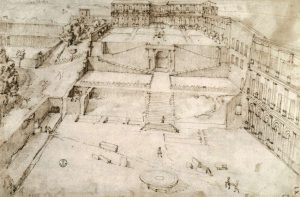 Appel à communication : « Entwurf, Planung und Baupraxis im Zeitalter Michelangelos » (Braunschweig, 1-3 avril 2019)
Appel à communication : « Entwurf, Planung und Baupraxis im Zeitalter Michelangelos » (Braunschweig, 1-3 avril 2019)
Internationale Konferenz vom 1. bis 3. April 2019, TU Braunschweig
Am Institut für Baugeschichte der TU Braunschweig ist ein DFG-gefördertes Forschungsprojekt zu „Entwurf, Entstehung und Wirkung der Biblioteca Laurenziana“ angesiedelt. Ausgehend vom Forschungsprojekt wird sich die Tagung „Entwurfsmethoden und Baupraxis um 1500 – Entwerfen, Planen und Bauen im Zeitalter Michelangelos“ dem Kontext des zeitgenössischen Planungswesens und der Baupraxis widmen. Sowohl die „großen Projekte“ wie auch das alltägliche Bauen des 15. und 16. Jh. sollen aus der Sicht der Umsetzung von der Planung zum Bauwerk beleuchtet werden. Dabei sind Traditionen der ‚Bauhütten’ und Werkstätten ebenso von Interesse wie die technischen Entwicklungen und Erfindungen, insbesondere mit Bezug auf die Architekturentwicklung in Florenz und Rom. Gewünscht sind Beiträge, die sich mit Fragen der Baustoffwahl und der Materialbearbeitung, der Fügung und Verbindung einzelner Bauelemente aber auch der Beschaffung und der Abrechnung auseinandersetzen, wie die Überlegungen zu verschiedenen Eigenheiten der Produktion von Architektur. Grundsätzlich sind Beiträge sind aus den Bereichen der historischen Bauforschung, der Bautechnikgeschichte, der Architektur- und Kunstgeschichte, sowie der historischen Quellenforschung und verwandten Disziplinen vorstellbar. Mit den Beiträgen kann der Frage nachgegangen werden, ob sich in der Bautechnik und der Ausführungs(planungs)-Praxis eigene „Handschriften“ der Bauleute und Baumeister erkennen lassen. Vertiefte Einblicke in Bauwesen und Bauorganisation im florentiner Architekturkontext des 15. und 16. Jahrhunderts sollen mit Blick auf die entstehenden Bauwerke (Dachwerke, Steinfügung, Wölbungen, Holz- und Steinbearbeitung, Deckenkonstruktionen, Maßsysteme) vorgestellt und im Kontext der „Wissensgeschichte der Architektur“ erörtert werden.
Folgende Themen werden angesprochen:
– Entwurfsmethoden im Umsetzungsprozess
– Werkstattorganisation, Materialflüsse und Bauablauf
– Bearbeitungs- und Fügetechniken von Baumaterialien
– Verhältnis von Auftraggeber, Baumeister und Bauausführenden (und etwaigen Zwischenpositionen)
– Kommunikationsmittel der Architekturproduktion (Verträge, Repräsentations- und Werkzeichnungen, Modelle, Bautagebücher, Abrechnungen)
– Diskussionen der theoretischen Grundlagen der Baupraxis
Reichen Sie bitten bis 13. Februar 2019 folgende Unterlagen ein:
– Titel des Vortrags – Abstract (max. 400 Wörter). Erläutern Sie darin den Zusammenhang zu dem angerissenen Forschungsfragen.
– Kurz CV mit Publikationen (max. eine DIN A4-Seite)
– Ggf. Reisekostenvoranschlag
Vorträge (20 min) und Diskussionen (10 min je Beitrag) in deutscher, englischer und italienischer Sprache sind möglich. Die Kosten für die Anreise und Übernachtung können mindestens anteilig erstattet werden. Die Beiträge werden im Anschluss an die Tagung in einem Tagungsband veröffentlicht werden.
Redaktion und Organisation:
Prof. Dr.-Ing. Alexander von Kienlin, Gunnar Schulz-Lehnfeld und Julian Bauch, TU Braunschweig
Prof. Dr.-Ing. Hermann Schlimme, TU Berlin
In Zusammenarbeit mit:
Prof. Dott. Vitale Zanchettin, IUA Venedig/Vatikan
Rückfragen an:
Gunnar Schulz-Lehnfeld, Institut für Baugeschichte, TU Braunschweig, Tel. +49 531 3912524
E-Mail: baugeschichte@tu-bs.de
CfP DESIGN, PLANING AND BUILDING PRACTICE IN THE AGE OF MICHELANGELO
International Conference, 1-3 April 2019, TU Braunschweig
As part of the DFG-funded research project “Design, Origin and Impact of the Biblioteca Laurenziana”, a conference will examine the context of contemporary planning and building practice. Both the « big projects » and the everyday building of the 15th and 16th centuries will be studied from the perspective of the execution from the planning to the built edifice. The traditions of the ‘opera’ and workshops are just as decisive as the technical developments and inventions, especially with regard to the architectural development in Florence and Rome. Requested are contributions that discuss questions about the selection of building materials and material processing, the joining and connection of individual building elements. Procurement and invoicing shall be discussed, as well as considerations on various “peculiarities” of the production of architecture. Contributions should come from the research fields of historical building research, construction history, architectural and art history, historical source research and further related disciplines. The contributions can be used to investigate the question as to whether the construction engineering and building (planning) practice of the builders and masters can reveal individual “peculiarity”. In-depth insights into the building industry and building organisation in the Florentine architectural context of the 15th and 16th centuries will be presented and discussed in the context of the “history of science in architecture”, with a view to the buildings being constructed (roof structures, stone joints, vaults, wood and stone processing, ceiling constructions, measuring systems). The following topics will be addressed:
– Design methods in the implementation process
– Workshop organisation, material flows and construction sequence
– Machining and joining techniques for building materials
– Relationship between client, architects, masters and builder (and any intermediate positions)
– means of communication in architectural production (contracts, representation and workshop drawings, models construction diaries, invoices)
– Discussion of the theoretical foundations of building practice
Please submit the following documents by 13 February 2019:
– Title of the paper
– Abstract (max. 400 words). Explain in it the connection to the research question raised.
– Short CV with publications (max. one DIN A4 page)
– estimate of costs of travel
Presentation (20 min) and discussions (10 min each paper) in German, English and Italian are possible. The costs for the journey and overnight stay can be refunded at least proportionately. Following the conference, the contributions will be published in a conference transcript.
Organizing committee:
Prof. Dr.-Ing. Alexander von Kienlin, Gunnar Schulz-Lehnfeld and Julian Bauch, TU Braunschweig
Prof. Dr.-Ing. Hermann Schlimme, TU Berlin
In cooperation with:
Prof. Dott. Vitale Zanchettin, IUA Venice/Vatican
Questions to:
Gunnar Schulz-Lehnfeld, Institute for Building History, TU Braunschweig, Tel. +49 531 3912524,
E-mail: baugeschichte@tu-bs.de

Leave a Reply
You must be logged in to post a comment.